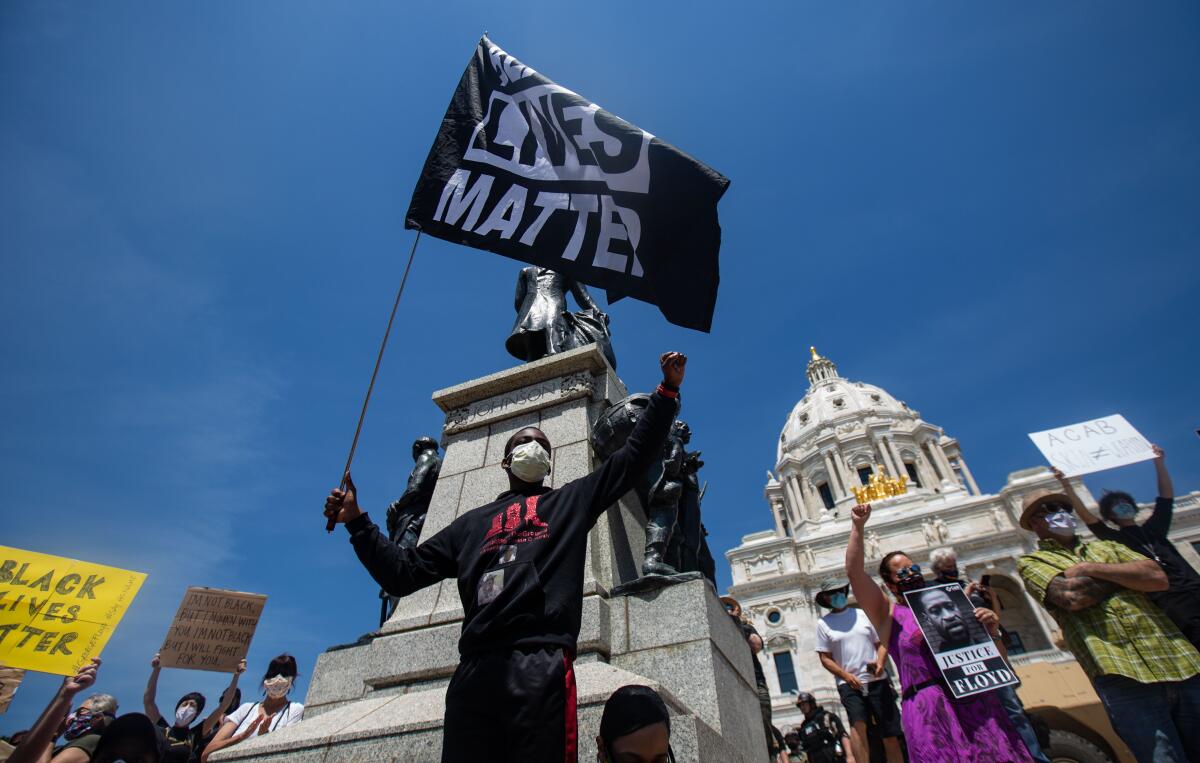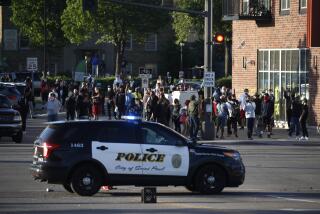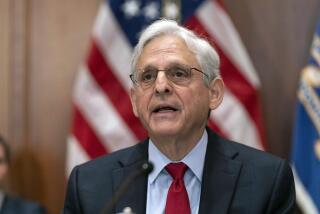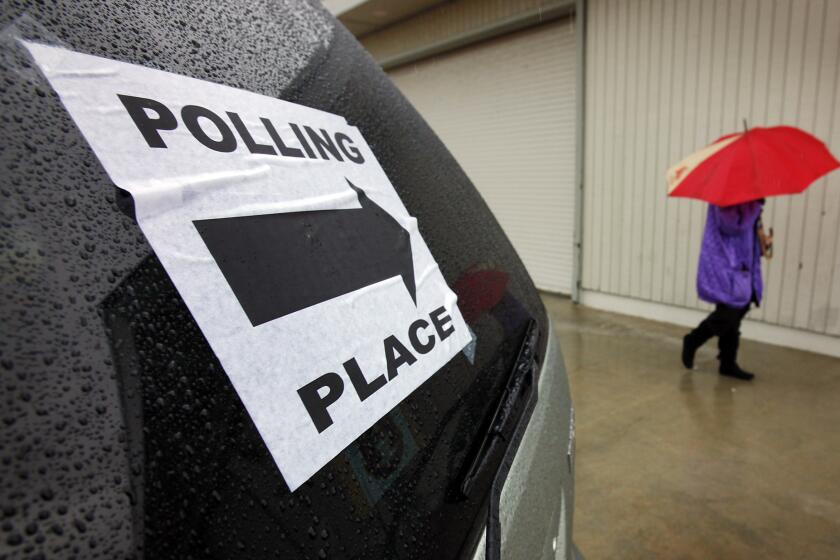George Floyd died a week ago, rocking Minneapolis and its mayor

MINNEAPOLIS — Mayor Jacob Frey took office two years ago after serving on the City Council, promising to address police brutality and styling himself as just the sort of young progressive who could accomplish what had cost his predecessor her job.
George Floyd had moved to the Twin Cities from Houston a few years earlier, a 6-foot, 7-inch security guard and truck driver looking to start a new life. Frey and Floyd traveled on separate tracks, but their paths fatally intersected one week ago when the fate of both men was set in motion by Police Officer Derek Chauvin.
Chauvin — a cop who would become the latest symbol of police abuse — has been charged with the murder of Floyd, whose death was recorded on a video that went viral. Floyd’s last words, “I can’t breathe,” became a rallying cry for Black Lives Matter, igniting protests in dozens of cities and forcing the nation to once again confront its deep history of racism.
Frey became an instant touchstone, speaking out against Chauvin and resonating with an understanding many leaders in other cities facing similar cases had been slow to offer: “Being black in America should not be a death sentence,” Frey said, apologizing to the African American community. “When you hear someone calling for help, you’re supposed to help. This officer failed in the most basic, human sense.”
But in less than a week, Frey has nearly abdicated control of his city to state officials and is fast fading into the background — along with a once bright political future. Some critics said the 38-year-old mayor, was destined to be overwhelmed. In an interview, he defended the high-stakes decisions he made in the days that followed Floyd’s death.
“Immediately after the tragic murder we fired the four officers, I called for charges — which was unprecedented — and knowing that we did not have the personnel to support this kind of crisis I immediately requested the National Guard,” he said by phone early Monday. “Those decisions I do not regret in the least.”
Frey said he delivered on his campaign promise to address heavy-handed policing in the city. But after taking office he resisted substantive police reforms, such as a strong citizen review process, officer drug testing and mental health assessments, said Michelle Gross, president of the local civil rights group Communities United Against Police Brutality.
Gross has known Frey since he served on the City Council before becoming mayor and said “they have resisted every accountability measure we have proposed” for the police department. When she saw Frey express sympathy about Floyd’s death, Gross said, it looked like “crocodile tears.”
“He’s like many Minnesotans: Friendly and not going to do a damn thing; not committed to justice,” she said.
But Jonathan Weinhagen, president and chief executive of the Minneapolis Regional Chamber, said the mayor is being treated unfairly: “He has done everything that he can, he has pulled every lever that he can as mayor in this crisis. He’s putting the people of Minneapolis first.”
Frey’s move to fire Chauvin and three other officers involved in restraining Floyd wasn’t enough to satisfy protesters, who took to the streets demanding the other officers be charged and the city address a legacy of aggressive policing. Frey appeared to have no plan for how to respond when protests spiraled out of control, which they did later that night, accompanied by looting and arson.
Floyd’s relatives did not want his memory lost in the chaos and violence on the streets. They pleaded for calm, even as they demanded murder charges against the other three officers involved in his death.
“My nephew was in the middle of changing his life,” said his uncle, Selwyn Jones, 54, a motel owner in Gettysburg, S.D.
He said Floyd, 46, whom the family called by his middle name, Perry, or “Big Floyd,” had attended college in Florida where he played basketball, then returned to Houston, had three children and dabbled in hip hop, joining the group Screwed Up Click. When Floyd’s mother died two years ago, Jones said, it shook him. He decided to move to Minneapolis where his aunt lived to “get his life right” and “tackle the world.” Jones visited him there and said he seemed happy.
“He would play one-on-one with you in a heartbeat just to show you that at [over] 40 he could still whup you,” Jones said.
Watching the video of death of his nephew, Jones focused on Chauvin’s face, which he said reminded him of a hunter posing with his kill.
“He had no remorse at all,” Jones said. “He executed my nephew in the middle of Minneapolis because he was black.”
He faulted prosecutors for waiting four days to charge Chauvin, calling the delay “horrific” and figuring it was intended to appease protesters. “They had to do something or the people was going to destroy Minneapolis,” Jones said, but given the looting that followed, “they might as well not have charged him.”
Floyd’s friend Corey Paul, 33, a Houston artist and entrepreneur, recalled how the man he knew as “Big Floyd” was “built like LeBron James.” Paul said Floyd helped create a basketball court ministry at housing projects in his Third Ward neighborhood before he moved away, “advocating for unity.”
Floyd would see black boys he knew on the street and ask how they were doing, and if they had enough money for food at school, Paul said. Those boys grew into youths who respected Floyd by default. He posted videos on Instagram pleading for an end to gun violence.
“Floyd didn’t have a badge, but he did what they were supposed to be doing,” Paul said. “Floyd’s respect came through love — he’d been sacrificing and giving to people for so long.”
It’s difficult for officials, especially white mayors like Frey, to build that trust or channel the rage of neighborhoods like the Third Ward or the one where Floyd was killed.
“Our communities, we’re not listening to outsiders — you’re not where I’m from, you don’t know our pain. But when Floyd spoke, we listened,” Paul said.
Days after Floyd’s death, Frey faced one of the most consequential decisions of his political career.
As raucous crowds roamed the smoldering wreckage and threatened to overrun Chauvin’s battered Third Precinct police station, Frey ordered the police to stand down. They didn’t have enough manpower to contain protesters, the mayor would later explain. Instead, they would allow the Third Precinct to burn and, in the days that followed, scores of local businesses.
Frey said it was the right call.
“There was a very real concern of loss of life or very serious injury,” he said. “I chose life over a brick-and-mortar structure.”
Any bridges that Frey, who grew up in a suburb of Washington, D.C., and moved to Minneapolis in 2009 to practice law, had built to improve his city’s police department burned with it, said Larry Jacobs, a professor of political science at the University of Minnesota.
“If he had been more decisive, if he had been able to marshal forces and kind of channel the frustration of Minneapolis residents over another episode with a police officer, things would not have reached the level it did by the end of the week,” Jacobs said.
He added: “From that point on, it was just absolute chaos.”
Gov. Tim Walz and state leaders assumed control of the response, leading what had been Frey’s daily briefings. Walz called in the National Guard and imposed a curfew, but the destruction spread. He responded with an overnight crackdown Saturday in which state police tear-gassed and pepper-sprayed thousands of peaceful protesters outside a police station.
“This is a term-defining week for Mayor Frey,” Jacobs said, “and will be difficult for him to escape.”
Floyd’s friend Paul is monitoring developments in Minneapolis from a distance, hoping the city doesn’t just blame Frey but seeks accountability.
“It’s not just on the mayor alone: It’s on the judges, it’s on the prosecutors, it’s on the people to push for it,” he said. “What they do in the beginning is often not enough and their follow-through is even worse. Floyd is illuminating that to people and causing it to be more than just a hashtag.”
Floyd’s uncle said his family still has many questions about how he died.
“The only thing that we know is that my nephew will never play with his babies, he will never dribble a basketball, he will never pick me up and act like he’s tougher. We will never see that beautiful smile,” he said.
He hasn’t slept since Tuesday. He said He plans to attend Floyd’s funeral in Houston and then travel to Minneapolis next week.
“I want to go to the spot where my nephew took his last breath and feel that vibe,” he said. “I seen the people walking today — and it was thousands — and I thought ‘Wow, he died for something.’ Maybe this was God’s way to say we’re going to have this particular person and this particular movement to change things.”
More to Read
Sign up for Essential California
The most important California stories and recommendations in your inbox every morning.
You may occasionally receive promotional content from the Los Angeles Times.











